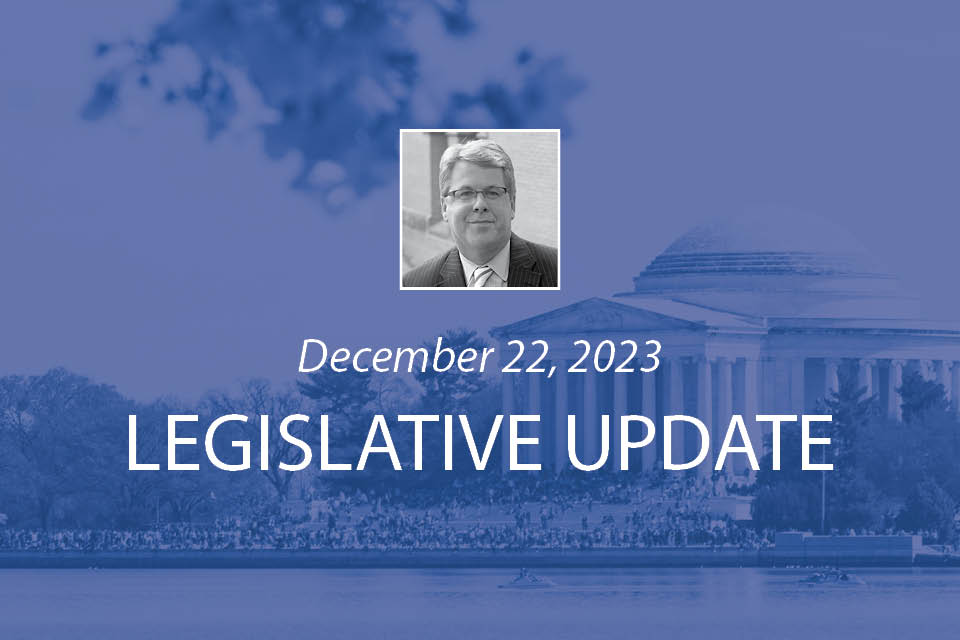Critical Deadlines and Key Priorities Await Congress
Both the House and the Senate have now left town for the holidays and will not return until the second week in January. When they do return, a key deadline will be looming as appropriations for roughly half of the federal government are set to expire on January 19. This will serve as another critical test for House Speaker Mike Johnson and potentially provide a key legislative vehicle to move provisions retroactively extending important tax benefits that have expired or are phasing out. ABMA will hit the ground running in the New Year to keep the pressure on Congress to act on beneficial tax policy, as well as our priorities in the workforce and transportation space.
Old Growth Forest Protection
On Wednesday, the U.S. Forest Service published a notice of intent (NOI) that proposes to amend all 128 forest plans to conserve, manage and recruit old growth forests on National Forest System (NFS) Lands. The NOI states that mature forests within the NFS lands will be used to promote and sustain future old growth forests. Language in the NOI signals that mature forests on federal lands will be managed/recruited to an old forest condition that may negatively impact national forest timber programs across the country. An inventory published by the Forest Service showed that 63 percent of NFS lands are considered mature or old growth forests by the agency. If this action is fully implemented, it will most certainly curtail timber harvesting on federal lands and may result in timber supply issues for sawmills that operate near or around federal forest landholdings.
The Federal Forest Resource Coalition—a group in Washington that represents mills the rely on the federal forests for timber– released a statement in response to the NOI stating “The Forest Service’s approach here is baffling. Congress has made it clear that job one is reducing the threat of catastrophic fires by thinning our National Forests, something our industry is more than capable of doing. Instead, the same staff who should be planning fuels treatments are going to be engaged in a rushed, top-down effort to amend every forest plan to restrict management options on even more acres of National Forests.”
The NOI has a 45-day comment period that closes on February 2, 2024. The agency will then prepare an Environmental Impact Statement (EIS) by June 2024 that will have a 90-day comment period. The Forest Service has targeted a final EIS publication in January 2025.
House Advances Bill to Extend CTA Deadlines
The House delivered some pre-holiday cheer last week when it advanced the Protect Small Business and Prevent Illicit Financial Activity Act (H.R. 5119) sponsored by Representatives Joyce Beatty (D-OH) and Zach Nunn (R-IA). This bill extends key deadlines under the Corporate Transparency Act (CTA). Recall that this anti-fraud/anti-corruption law, slated to take effect in less than two weeks, imposes recordkeeping and reporting requirements on small businesses with stiff penalties for non-compliance. The bill passed on a 420 to 1 vote.
While the House was approving the Nunn bill, a bicameral group of more than 80 senators and representatives sent a letter to the Financial Crimes Enforcement Network (FinCEN)—the arm of the Treasury Department charged with implementing the statute–calling for a one-year delay of all reporting requirements under the CTA. Led by Senators Mike Rounds (R-SD) and Rick Scott (R-FL) alongside Representatives Warren Davidson (R-OH) and Patrick McHenry (R-NC), the group writes:
Unfortunately, FinCEN is woefully behind in educating small business owners and stakeholders of their new obligations under the CTA that begin in just a few short weeks. In fact, a National Federation of Independent Business (NFIB) survey found that 90 percent of respondents were entirely unfamiliar with these reporting requirements. Even more concerning is that the CTA has civil and criminal penalties of up to $10,000 and two years of jail time for failure to comply. This lack of awareness and education is alarming and must be addressed before the law is implemented. Dozens of organizations, representing millions of small businesses operating in every state and community across the country, have already publicly expressed their strong support for delaying implementation of the beneficial ownership information (BOI) reporting requirements by one year.
While the Senate has left town and will not be acting on the issue before the new year, we expect that, given the widespread support in both chambers for extending CTA compliance deadlines, the Senate will act quickly in January on approving legislation.




